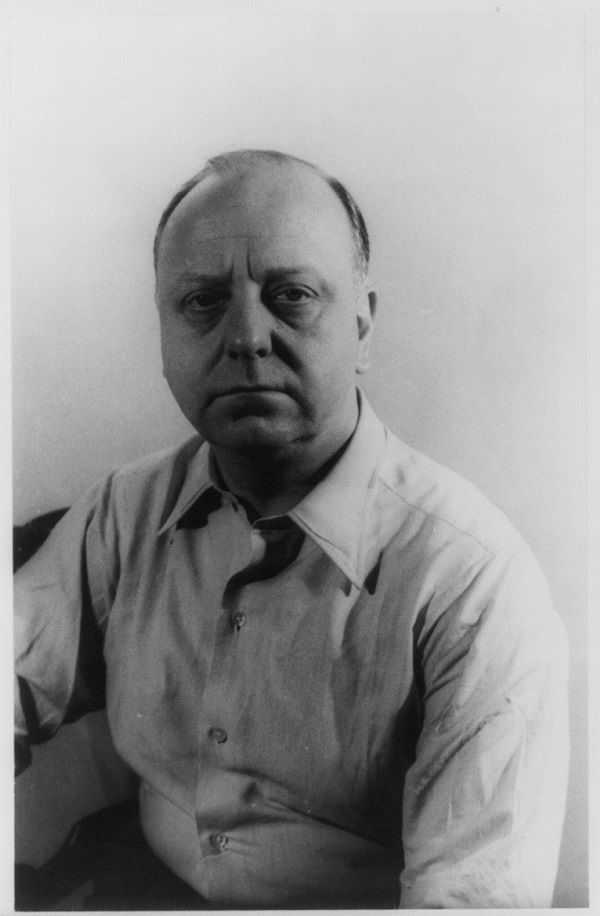Prelude in KC
Virgil Thomson, a future composer and music critic, was born on November 25, 1896 in Kansas City, Missouri. Although he would go on to live much of his life in New York and Paris, and brush elbows with world-renowned musicians and intellectuals, Thomson always claimed he drew on the musical inspirations he learned during his childhood in Kansas City.

At the age of five, Thomson began his first informal piano lessons. By high school, he played the organ for several churches, including the one to which his family belonged, the Calvary Baptist Church. He attended Kansas City's Central High School, where he grew adept at writing lyrics. In Kansas City, Thomson also made his earliest forays into the musical world, sampling such diverse forms as church hymns, popular folk songs, ragtime, and early versions of jazz.
After graduating high school, Thomas joined the National Guard and was nearly shipped to France before World War I ended. After the war, he entered Harvard thanks to a loan from Dr. Fred M. Smith, the president of the Reorganized Church of Jesus Christ of Latter Day Saints and grandson of Joseph Smith, who had founded the Mormon religion. Thomson secured the loan thanks to his friendship with Fred Smith's daughter, Alice Smith. At Harvard, Thomson focused his studies on the piano work of Erik Satie. He studied in Paris on fellowship for a year, and after graduating, lived in Paris from 1925-1940. In Paris he forged relationships with such prominent cultural figures as James Joyce, Ernest Hemingway, e. e. cummings, Aaron Copland, Ezra Pound, Igor Stravinsky, Pablo Picasso, Orson Welles, Jean Cocteau, and Gertrude Stein.
Thomson became well-known for his collaborations with Gertrude Stein. In 1928, they wrote an exceptionally well-received opera, called Four Saints in Three Acts. Thomson put music to Stein's graceful poetry. His musical score captured the rhythmic boyhood charm gleamed from Kansas City, and managed to channel it through a more formal, neo-classical French style. In addition to his work with Stein, he used these techniques to write scores for the early documentary films of Pare Lorentz, including The Plow That Broke the Plains and The River.
The start of World War II compelled Thomson to move back to New York City, where he took up permanent residence at the Chelsea Hotel. For American intellectual and cultural leaders, an invitation to a dinner party at Mr. Thomson's opulent apartment became highly sought after. He continued living there for nearly 50 years, with occasional stretches spent in Paris, until his death.
From 1940 through 1954, Thomson was the lead music critic for the New York Herald Tribune newspaper. As critic, he gained a reputation for falling asleep during subpar operas and concerts. His reviews, however, were always well-written, often provocative, and sometimes belittling. They were also easily accessible to a general readership that lacked specialized knowledge of music. The most common theme of his criticisms was that the prevailing music was too pompous and overpowering for the audience. These reviews were later compiled in four books. Other publications by Thomson included an autobiography, a collection of essays on modern American music, and a book of his correspondence with famous friends and colleagues, as well as not-so-famous readers of his column.
Thomson's own career as a composer also peaked after he became the chief music critic for the Herald Tribune. In 1949 he became the only musician ever to win a Pulitzer Prize for a film score, which accompanied the documentary, Louisiana Story. Other awards Thomson won included 16 honorary doctorates from various universities, the Kennedy Center Award for Lifetime Achievement, and a National Medal of Arts from the United States Congress.
Throughout his life, Virgil Thomson occasionally returned to Kansas City. On one of these visits in 1982, he referenced how important his home town had been in shaping his life, saying, "I always loved Paris because Paris reminded me of Kansas City. Paris, like Kansas City, has good food, religion and vice – all things that make life in a city worth living." Many music-lovers similarly observed that the Kansas City spirit had infused Thomson's compositions and talent for musical criticism, making his work stand out from the typical New York or Paris fare. On September 30, 1989, Thomson died in his Chelsea Hotel apartment at the age of 92. Noting the profound influence of Virgil Thomson, friend and colleague Leonard Bernstein, commented that, "The death of Virgil T is like the death of an American city: it is intolerable."
Read a full biographical sketch of Virgil Thomson, prepared for the Missouri Valley Special Collections, the Kansas City Public Library:
- Biography of Virgil Thomson (1896-1989), composer and music critic, by John A. Horner.
Visit the Virgil Thomson Foundation Website.
View images of people and Kansas City landmarks that were related to Virgil Thomson, located in the Missouri Valley Special Collections:
- Central High School, 1890; where Thomson graduated.
- Postcard of Central High School; with accompanying historical article.
- Joseph Smith, Joseph Smith III, and Fred M. Smith; Joseph Smith, founder of the Church of Jesus Christ of Latter Day Saints, was the grandfather of Fred M. Smith, who funded Virgil Thomson's education at Harvard. Fred Smith was the father of Alice Smith, who was Virgil Thomson's junior college friend.
- Street activities near the Calvary Baptist Church.
- Calvary Baptist Church, 1890; where the Thomson family attended church services.
- Muehlebach Hotel; where Thomson stayed whenever he visited Kansas City.
Check out the following books, articles, and films written by or about Virgil Thomson, held by the Kansas City Public Library:
- Virgil Thomson, by Virgil Thomson; an autobiography.
- The Art of Judging Music, by Virgil Thomson.
- Music with Words: A Composer's View, by Virgil Thomson; Thomson writes about how he learned to compose music.
- American Music Since 1910, by Virgil Thomson.
- Virgil Thomson, A Reader: Selected Writings, 1924-1984, by Virgil Thomson and Richard Kostelanetz.
- A Virgil Thomson Reader, by Virgil Thomson.
- The Selected Letters of Virgil Thomson, by Virgil Thomson, Tim Page, and Vanessa Weeks Page; includes correspondence between Thomson and the readers of his work as music critic for the New York Herald Tribune, among other insightful correspondence.
- Virgil Thomson: Composer on the Aisle, by Anthony Tommasini; a full biography of Virgil Thomson.
- Prepare for Saints: Gertrude Stein, Virgil Thomson, and the Mainstreaming of American Modernism, by Steven Watson.
Continue researching Virgil Thomson using archival material held by the Missouri Valley Special Collections:
- Book Titles on the Kansas City Public Library Parking Garage; books that appear on the Central Library parking garage include Virgil Thomson, a Reader, by Virgil Thomson.
- Vertical File: Thomson, Virgil.
- "The Virgil Thomson Centenary, 1896-1996"; program for the 1996 celebration of Virgil Thomson by the Brooklyn Philharmonic Orchestra.
- Composer Returns, Strikes a Witty Note," in the Kansas City Times, April 1, 1982.
References:
John A. Horner, "Biography of Virgil Thomson (1896-1989), composer and music critic," the Missouri Valley Special Collections, the Kansas City Public Library.
John Rockwell, "Virgil Thomson, Composer, Critic and Collaborator with Stein, Dies at 92," New York Times, October 1, 1989.
Richard Pearson, "Composer, Music Critic Virgil Thomson Dies," Washington Post, October 1, 1989.
Joseph McLellan, "Virgil Thomson, Music's All-American," Washington Post, October 2, 1989.


